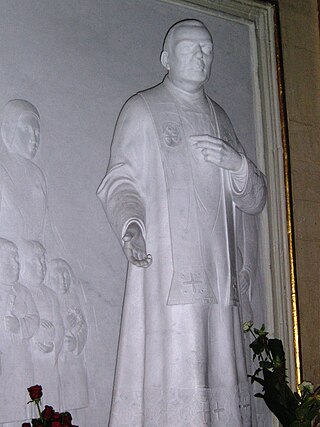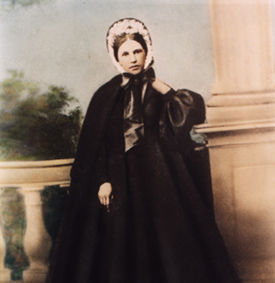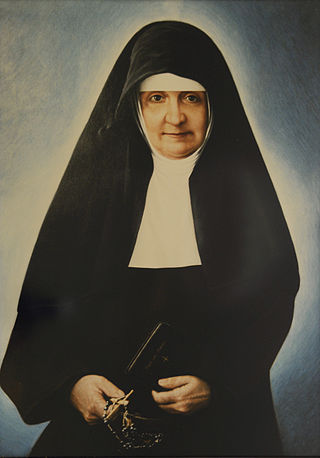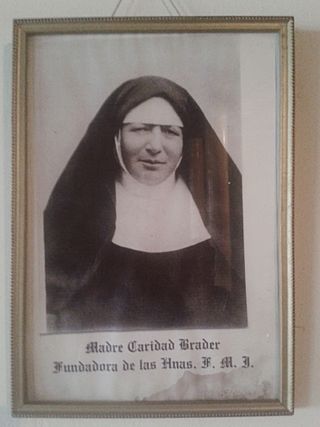Zofia Czeska-Maciejowska was a Polish religious sister and the founder of the Sisters of the Presentation of the Blessed Virgin Mary. Czeska was widowed following her call into the religious life. Her beatification was celebrated on 9 June 2013.

Filippo Smaldone was an Italian Roman Catholic priest and the founder of the Salesian Sisters of the Sacred Hearts. Smaldone is best known for his extensive work with the deaf during his lifetime. Smaldone was a gifted preacher known for his commitment to proper catechesis and to the care of orphans and the mute, which earned him civic recognition.

The Missionary Sisters Servants of the Holy Spirit, also known as Holy Spirit Missionary Sisters, or simply Holy Spirit Sisters is a religious congregation within the Catholic Church. The group has 3,000 members in 46 different countries. The congregation was founded by Arnold Janssen in 1889 in Steyl, the Netherlands. Janssen had previously founded in 1875 a male missionary congregation called Divine Word Missionaries. Janssen chose Maria Helena Stollenwerk, called Mother Maria (1852–1900) and Hendrina Stenmanns, called Mother Josepha (1852–1903) as co-foundresses.

Maria Franciszka Siedliska, also known by her religious name Maria of Jesus the Good Shepherd, was a Polish Roman Catholic professed religious and the founder of the Sisters of the Holy Family of Nazareth. In childhood Siedliska was indifferent to her faith but after a local priest had converted her she became aware of a call to the religious life which her parents opposed. However the death of her father in 1870 enabled her to pursue her vocation. In 1873 she decided to found a religious congregation that received the blessing of Pope Pius IX before being established during Advent in 1875. Siedliska expanded her congregation from Rome to her native Poland and elsewhere, including Great Britain, France and the USA where she visited during her extensive travels.

María Bernarda Bütler, born Verena Bütler, was a Swiss religious sister. She founded the Franciscan Missionary Sisters of Mary Help of Sinners and served in the missions in Ecuador and Colombia. Bütler worked for the care of the poor in these places until her exile from Ecuador and entrance into Colombia where she worked for the remainder of her life. The congregation moved there with her, and continued to expand during her time there until her death.
Paolo Manna was an Italian Roman Catholic priest and a member from the Pontifical Institute for Foreign Missions as well as the founder of the Pontifical Missionary Union. Manna worked in the missions in Burma and even served as the Superior General for PIME. Manna did much in his life to promote the missions and the evangelic and apostolic zeal that accompanied it and he established newspapers and movements to help promote this charismatic apostolate. He also held several leadership positions in PIME and used that standing in order to further engage with prospective missionaries.

Bolesława Maria Lament was a Polish religious sister and the founder of the Missionary Sisters of the Holy Family. Lament worked as a seamstress and soon joined a religious congregation though left just prior to her profession upon experiencing vocational doubts; she returned to her life as a seamstress and worked with two of her sisters to support their siblings and widowed mother. The death of her seminarian brother prompted her to return to the religious life – Honorat Koźmiński encouraged this return – and she later founded a congregation that soon spread and took her to Russia though its revolution forced her departure during World War I. Pope John Paul II beatified Lament while in Poland in 1991.

Eusebia Palomino Yenes was a Spanish Roman Catholic professed religious and a professed member from the Salesian Sisters of Don Bosco. Palomino worked as a domestic in her adolescence having withdrawn from her education in order to support her parents though she later worked with the Salesian Sisters before she began the process of becoming a religious of that order in the 1920s; she afterwards continued most of the same duties and became known for her devotion to the five wounds of Jesus Christ and to the Via Crucis.

Maria Domenica Mantovani was an Italian Roman Catholic professed religious, and the co-founder of the Little Sisters of the Holy Family; she established them alongside Giuseppe Nascimbeni. As a nun she received the religious name of Maria of the Immaculate.
María Pilar Izquierdo Albero was a Spanish religious sister who founded the Missionary Work of Jesus of Mary (1939). Albero founded her order at the end of the Spanish Civil War - when it was safe to do so - after having rallied from a serious form of blindness and paralysis from 1927 to 1939 though her order was later disbanded and restarted again after a series of complications.

Blessed María Pilar López de Maturana Ortiz de Zárate, also known by her religious name Margarita María, was a Spanish Roman Catholic professed religious and the founder of the Mercedarian Missionaries of Bérriz. The religious made several international trips in order to serve in the missions as her order often dabbled in and undertook these trips despite a serious ulcer that transcended into stomach cancer but nevertheless she continued to promote the charism of the missions.
Blessed Bruna Pellesi, known as Maria Rosa of Jesus, was an Italian nun who was a member of the Franciscan Missionary Sisters of Christ. Pellesi served as an educator in places such as Sassuolo until she contracted tuberculosis and was moved to various sanatoriums for recuperation until the end of her life when she died in her convent.

Assunta Marchetti, SS was an Italian Catholic who cofounded of the Missionary Sisters of Saint Charles Borromeo. She worked in Brazil from 1895 until her death.

Maria Karłowska – in religious Maria of Jesus Crucified – was a Polish Roman Catholic professed religious and the founder of the Sisters of the Divine Shepherd of Divine Providence. Karłowska worked with poor and abandoned people with an emphasis on girls and also tried to aid prostitutes avoid such a life and build another kind of life so used her order to reach out to such people to render assistance.

Elena Guerra, OSS was an Italian Catholic religious sister who founded the Oblates of the Holy Spirit. Guerra was a strong proponent of the Holy Spirit as a motivation to do pious works. She dedicated her life particularly to the education of Chinese and African girls.

Elisa Angela Meneguzzi was an Italian Roman Catholic professed religious and a member of the Sisters of Saint Francis de Sales. She assumed the religious name of "Liduina" upon making her solemn profession into the order. She also served in the missions in Ethiopia where she became known for her care of the ill and for her efforts at increased ecumenism; this earned her two titles: "Sister Gudda" and the "Ecumenical Flame".

Hendrina Stenmanns, SSpS was a German Catholic religious sister who co-founded the Missionary Sisters Servants of the Holy Spirit, which she founded alongside Arnold Janssen and Helena Stollenwerk. She was also a professed member of the Third Order of Saint Francis since 1871. Stenmanns was beatified on 29 June 2008 in the Netherlands. Pope Benedict XVI delegated Cardinal José Saraiva Martins to preside over the celebration on his behalf.
Vicenta Chávez Orozco, also known by her religious name María Vicenta de Santa Dorotea, was a Mexican Roman Catholic nun and the founder of the Servants of the Holy Spirit and the Poor. Orozco was admitted into a hospital in Guadalajara with pneumonia and there experienced a radical call to help others in the same hospital who were ill - she recovered and soon returned to fulfil this promise while later becoming a religious and establishing her own order in order to advance this mission.

Maria Josefa Karolina Brader, also known by her religious name Maria Caridad of the Holy Spirit, was a Swiss religious sister who founded the Franciscan Sisters of Mary Immaculate. Brader served as a member of the missions in Ecuador for a brief period of time before being transferred to Colombia where she served as a catechist and evangelizer for the remainder of her life.

Colomba Matylda Gabriel - in religious Janina - was a Ukrainian Roman Catholic professed religious and the founder of the Benedictine Sisters of Charity. Gabriel studied under the Order of Saint Benedict in Lviv and later became a Benedictine herself while dedicating herself to teaching at her old school before she was forced to relocate to Rome in 1900 where she founded her order and joined a Benedictine branch there.















